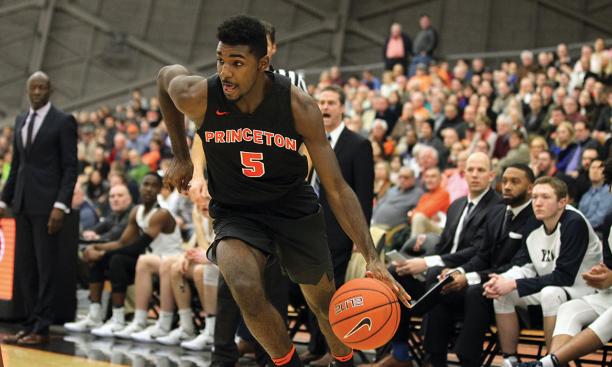
Courtney Banghart and Mitch Henderson ’98 played in the Ivy League when only the regular season mattered.
Now the head coaches of women’s and men’s basketball are working for the chance to bring their Princeton teams to the first Ivy postseason tournament and compete for bids to the NCAA Tournament.
“I think the [Ivy] tournament presents the opportunity to have your best teams showcased on the national stage,” Banghart said. “It’s a big deal for our student-athletes, and it’s a big deal for our league. I think people will see how good our league is when they see the better teams going head-to-head.”
The tournament, which was approved unanimously by the Ivy schools, will be held March 11–12 at the Palestra in Philadelphia, with the top four men’s teams and women’s teams playing. (For schedule details and television coverage, visit IvyMadness.com.) The Ivy League is the last of the 32 conferences in Division I to add a postseason tournament to decide its NCAA automatic bids.
The tournament represents “a chance to congregate and not only celebrate a champion but also be together as a league,” Henderson said. “On Selection Sunday, you’re playing your championship game.”
The Ivy’s double-round-robin regular season — the “14-game tournament” — still will crown the league champions, but the postseason will determine which team advances to the NCAA Tournament in a league that historically has received only one NCAA bid. (Last year the Princeton women became the first Ivy team to receive an at-large bid.)
“There’s a different energy,” Henderson said of the regular season. “The living and dying is lessened. But there’s no less urgency.”
Witness Princeton’s riveting Feb. 4 games against Harvard: In front of a sellout crowd in Cambridge, Steven Cook ’17 rebounded a missed free throw and laid it in with less than three seconds left to give the Tigers a 57–56 win and keep the men in first place at 5–0; at Jadwin Gym, with a season-high 2,110 fans on hand, Gabrielle Rush ’19 fueled the Tiger women to a critical 63–58 win in overtime that put them ahead of Cornell for fourth place in the standings at 3–2.
The Princeton women lost their first two league games, which normally would cripple an Ivy team’s postseason prospects. But the tournament, Banghart said, “allows you to be playing for more for longer.”
In each year since 2010, the Princeton, Harvard, and Yale men have finished in the top four, as have the Princeton and Harvard women. Every school except Cornell would have qualified at least once had the Ivy tournaments existed in that span.
“There are really four good teams on the men’s and women’s sides now,” Banghart said. “And it’s not just a one-year anomaly.”
Last year, only 10 of 31 men’s regular-season champions and 16 of 31 on the women’s side won their conference tournaments — statistics that are either worrisome or encouraging, depending on where the Tigers are placed in the postseason bracket.
UPDATE: The Princeton men improved their Ivy record to 10-0 with a win at Brown Feb. 18 and are now guaranteed a spot in the four-team Ivy Tournament field. The Princeton women, at 7-2, are one game behind first-place Penn in the Ivy standings with five games remaining, including a March 7 rematch with the Quakers at the Palestra.
